Type 'string or undefined' is not assignable to type string
Last updated: Feb 29, 2024
Reading time·8 min

# Table of Contents
- Type 'string or undefined' is not assignable to type string
- Argument of type 'string or undefined' is not assignable to parameter of type string
If you got the error "Argument of type string | undefined is not assignable to parameter of type string", click on the second subheading.
# Type 'string or undefined' is not assignable to type string
The "Type 'string | undefined' is not assignable to type string" error occurs
when a possibly undefined value is assigned to something that expects a
string.
To solve the error, use the non-null assertion operator or a type guard to
verify the value is a string before the assignment.
Here is an example of how the error occurs.
interface Employee { id: number; name?: string; // 👈️ optional (might be undefined) salary: number; } const emp: Employee = { id: 1, name: 'Bobby Hadz', salary: 100, }; // ⛔️ Error: Type 'string | undefined' is not assignable to type 'string'. // Type 'undefined' is not assignable to type 'string'.ts(2322) const name: string = emp.name;
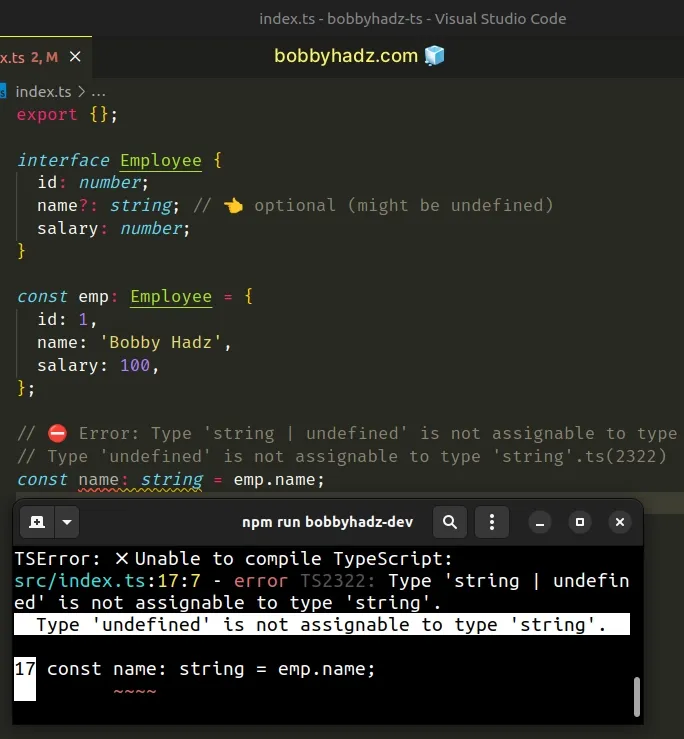
The name property is marked as
optional
in the Employee interface.
string or an undefined value.The name variable is typed as a string, so it only expects to get assigned a
value that is a string.
emp.name property might have a value of undefined which is not compatible with the type of the name variable which only expects a string.# Use the non-null assertion operator to solve the error
One way to solve the error is to use the non-null assertion operator.
interface Employee { id: number; name?: string; salary?: number; } const emp: Employee = { id: 1, name: 'Bobby Hadz', salary: 100, }; // eslint-disable-next-line @typescript-eslint/no-non-null-assertion const name: string = emp.name!; // 👈️ non-null assertion
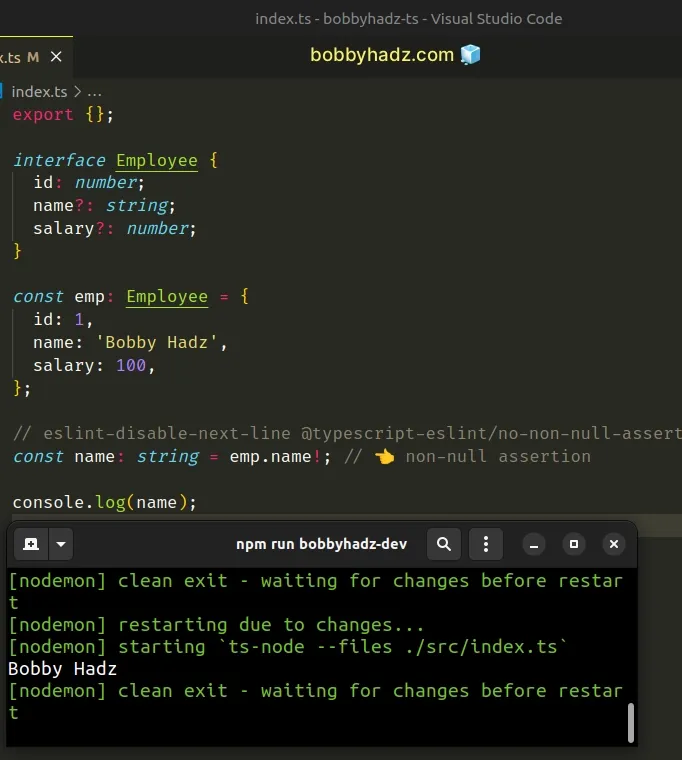
The exclamation mark is the non-null assertion operator in TypeScript.
null and undefined from a type without doing any explicit type-checking.When you use this approach, you basically tell TypeScript that this value will
never be null or undefined.
# Use a type-guard to solve the error
An alternative and much better approach is to use a type guard.
interface Employee { id: number; name?: string; salary?: number; } const emp: Employee = { id: 1, name: 'Bobby Hadz', salary: 100, }; const name: string = emp.name !== undefined ? emp.name : ''; console.log(name); // 👉️ "Bobby Hadz"
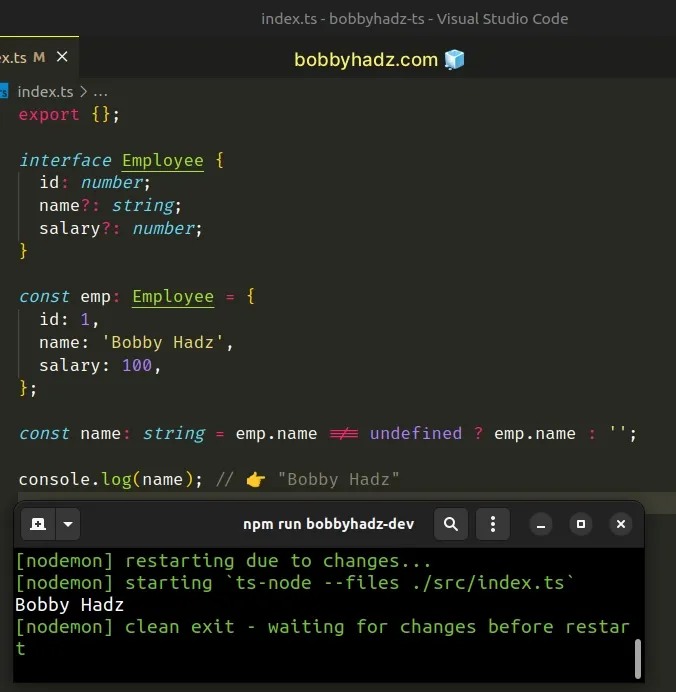
We used the
ternary operator to
check if the name property is not equal to undefined.
If the property is not equal to undefined, it gets assigned to the name
variable, otherwise, we use an empty string as a fallback.
name variable will always get assigned a string, even if emp.name is undefined.# Use the nullish coalescing operator (??) to solve the error
You could also use the nullish coalescing operator (??) to solve the error.
interface Employee { id: number; name?: string; salary?: number; } const emp: Employee = { id: 1, name: 'Bobby Hadz', salary: 100, }; const name: string = emp.name ?? ''; console.log(name); // 👉️ "Bobby Hadz"
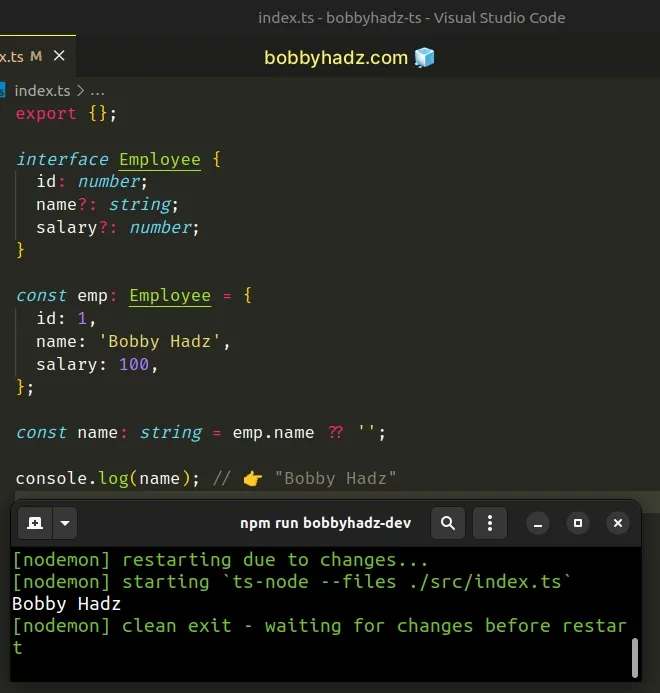
null or undefined.So, if emp.name is null or undefined, we set the name variable to an
empty string.
# Use the logical OR (||) operator to solve the error
You can also use the logical OR (||) operator in a similar way.
interface Employee { id: number; name?: string; salary?: number; } const emp: Employee = { id: 1, name: 'Bobby Hadz', salary: 100, }; const name: string = emp.name || ''; console.log(name); // 👉️ "Bobby Hadz"
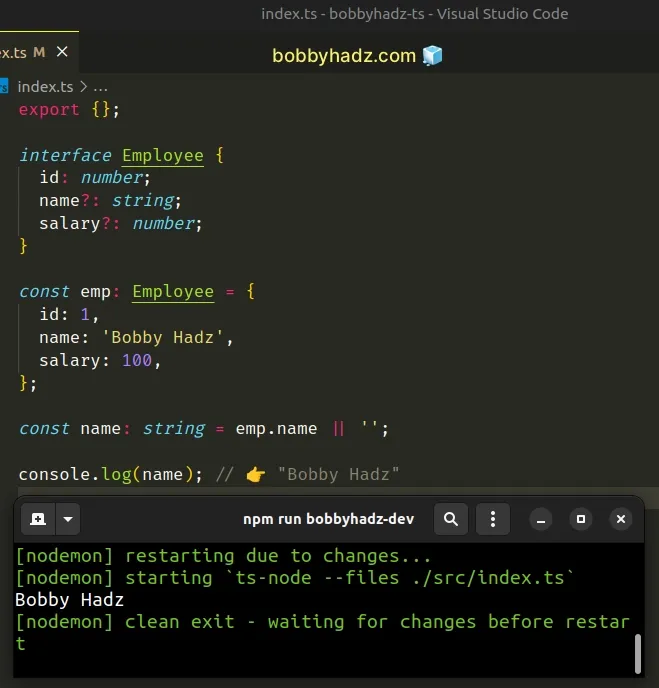
The logical OR (||) operator returns the value to the right if the value to the left is falsy.
null and undefined.The logical OR (||) operator would return the value to the right if the value to
the left is any of the following: null, undefined, false, 0, "" (empty
string), NaN (not a number).
# Use an if statement to solve the error
Even a simple if statement that serves as a type guard can be used to solve
the error.
interface Employee { id: number; name?: string; salary?: number; } const emp: Employee = { id: 1, name: 'Bobby Hadz', salary: 100, }; let name = ''; // 👇️ emp.name is a string or undefined here if (emp.name !== undefined) { // 👇️ emp.name is string here name = emp.name; } console.log(name); // 👉️ "Bobby Hadz"
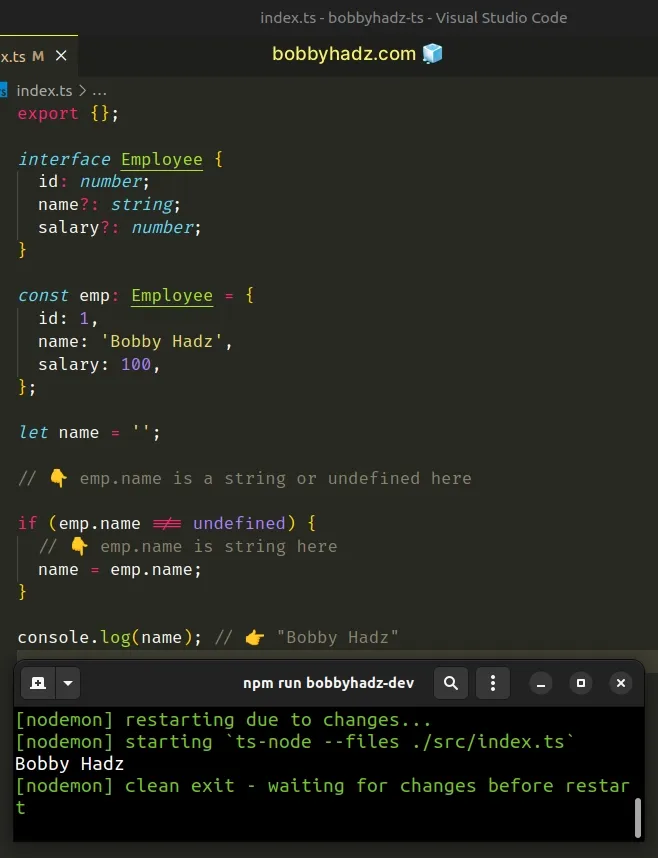
We used the let keyword to initialize the name variable to an empty string.
In the if statement, we check if the emp.name property is not equal to
undefined and assign the name variable to the corresponding value.
# Use a type assertion to solve the error
If nothing of the above works, you can use a type assertion.
interface Employee { id: number; name?: string; salary?: number; } const emp: Employee = { id: 1, name: 'Bobby Hadz', salary: 100, }; const name: string = emp.name as string; // 👈️ type assertion console.log(name); // 👉️ "Bobby Hadz"
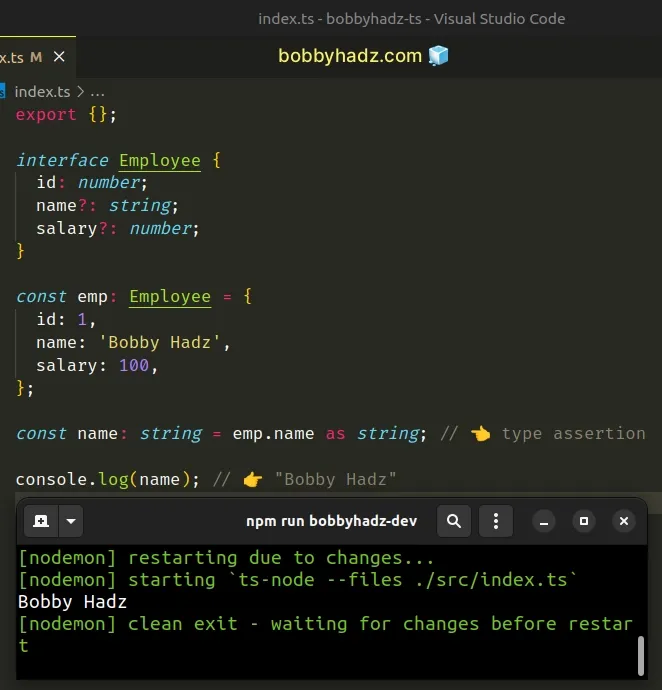
We effectively tell TypeScript that emp.name will be a string and not to
worry about it.
# Using the Required utility type to solve the error
You can also solve the error by using the Required utility type to mark all
properties of the object as required.
interface Employee { id: number; name?: string; // 👈️ optional (might be undefined) salary: number; } const emp: Required<Employee> = { id: 1, name: 'Bobby Hadz', salary: 100, }; const name: string = emp.name; console.log(name);
We used the Required utility type to construct a new type with all of the properties of the provided type set to required.
The name property is no longer optional in the new type, so it can never store
an undefined value.
# Argument of type 'string or undefined' is not assignable to parameter of type string
The error "Argument of type string | undefined is not assignable to parameter of
type string" occurs when a possibly undefined value is passed to a function
that expects a string.
To solve the error, use a type guard to verify the value is a string before
passing it to the function.

Here is an example of how the error occurs.
function getMessage(message: string) { return message; } // 👇️ const message: "Greetings" | undefined const message = Math.random() > 0.5 ? 'Greetings' : undefined; // ⛔️ Error: Argument of type 'string | undefined' is not // assignable to parameter of type 'string'. // Type 'undefined' is not assignable to type 'string'. ts(2345) getMessage(message);
The function expects to be called with an argument of type string but the
passed in argument is possibly undefined.
undefined which is not compatible with the type of the function's parameter that has to be a string.# Use a non-null assertion in the function call
One way to get around this is to use a non-null assertion.
function getMessage(message: string) { return message; } // 👇️ const message: "Greetings" | undefined const message = Math.random() > 0.5 ? 'Greetings' : undefined; getMessage(message!); // 👈️ non-null assertion
The exclamation mark is the non-null assertion operator in TypeScript.
undefined and null from a type without doing any explicit type-checking.When you use this approach, you basically tell TypeScript that this value will
never be undefined or null.
# Use a type assertion in the function call
This is very similar to a type assertion and should only be used when you're absolutely sure that the value is of the expected type.
function getMessage(message: string) { return message; } // 👇️ const message: "Greetings" | undefined const message = Math.random() > 0.5 ? 'Greetings' : undefined; getMessage(message as string); // 👈️ type assertion
We effectively tell TypeScript that the message variable stores a string and
not to worry about it.
# Use the ternary operator to solve the error
An alternative and much better approach is to use a type guard.
function getMessage(message: string) { return message; } // 👇️ const message: "Greetings" | undefined const maybeMessage = Math.random() > 0.5 ? 'Greetings' : undefined; const message: string = maybeMessage !== undefined ? maybeMessage : ''; getMessage(message);
We used the
ternary operator to
check if the maybeMessage variable is not equal to undefined.
If it's not equal to undefined, it gets assigned to the message variable,
otherwise, we use an empty string as a fallback.
message variable will always get assigned a string, even if the maybeMessage variable is undefined.# Use the nullish coalescing operator (??) in the function call
You could also use the nullish coalescing operator (??) to solve the error.
function getMessage(message: string) { return message; } // 👇️ const message: "Greetings" | undefined const maybeMessage = Math.random() > 0.5 ? 'Greetings' : undefined; getMessage(maybeMessage ?? ''); // 👈️ nullish coalescing
undefined or null.If the maybeMessage variable is undefined or null, we pass an empty string
argument to the function.
# Use the logical OR (||) operator in the function call
You can also use the logical OR (||) operator in a similar way.
function getMessage(message: string) { return message; } // 👇️ const message: "Greetings" | undefined const maybeMessage = Math.random() > 0.5 ? 'Greetings' : undefined; getMessage(maybeMessage || '');
The logical OR (||) operator returns the value to the right if the value to the left is falsy.
undefined and null.The logical OR (||) operator would return the value to the right if the value to
the left is any of the following: null, undefined, false, 0, "" (empty
string), NaN (not a number).
# Update the type of the function's parameter
The cause of the error is that the type of the function's parameter and the type of the passed-in argument are not compatible.
Depending on your use case, you could also solve the error by updating the type of the function's parameter and making the parameter and the passed-in argument compatible types.
// 👇️ parameter is type string or undefined function getMessage(message: string | undefined) { return message; } // 👇️ argument is also type string or undefined const maybeMessage = Math.random() > 0.5 ? 'Greetings' : undefined; getMessage(maybeMessage);
The function's parameter is now typed as string or undefined, so we are able
to pass it an argument of type string or undefined because the two types are
compatible.
We used a union type in the example, but we could have also marked the parameter as optional.
function getMessage(message?: string) { // 👈️ optional return message; } // 👇️ argument is also type string or undefined const maybeMessage = Math.random() > 0.5 ? 'Greetings' : undefined; getMessage(maybeMessage);
The code sample achieves the same result. When a parameter is marked as
optional, it can either be of the specified type or have an undefined value.
# Additional Resources
You can learn more about the related topics by checking out the following tutorials:
- How to type an async Function in TypeScript
- How to set Default Parameters in TypeScript
- How to Check the Type of a Variable in TypeScript
- Set the return type of an arrow function in TypeScript
- Using generics in Arrow functions in TypeScript
- Type 'string or null' is not assignable to type string (TS)
- Type 'undefined' is not assignable to type in TypeScript

